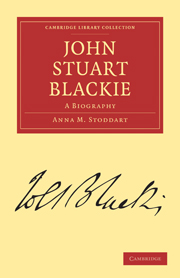Book contents
- Frontmatter
- PREFACE TO THE FIRST EDITION
- Contents
- CHAPTER I PARENTAGE AND CHILDHOOD. 1809–1819
- CHAPTER II AT SCHOOL AND COLLEGE. 1820–1829
- CHAPTER III STUDENT LIFE IN GÖTTINGEN. 1829
- CHAPTER IV STUDENT LIFE IN BERLIN. 1829–1830
- CHAPTER V ROME. 1830–1831
- CHAPTER VI END OF WANDERJAHRE. 1831–1832
- CHAPTER VII YEARS OF STRUGGLE. 1832–1837
- CHAPTER VIII THE TEST ACTS. 1837–1840
- CHAPTER IX INSTALLATION AND MARRIAGE. 1841–1842
- CHAPTER X ABERDEEN AND UNIVERSITY REFORM. 1842–1850
- CHAPTER XI ‘ÆSCHYLUS’ AND THE GREEK CHAIR. 1850–1852
- CHAPTER XII EDINBURGH. 1852–1857
- CHAPTER XIII LAYS, LECTURES, AND LYRICS. 1857–1860
- CHAPTER XIV HOMER. 1861–1866
- CHAPTER XV THE HIGHLANDS AND ISLANDS. 1866–1870
- CHAPTER XVI PILGRIM YEARS. 1870–1872
- CHAPTER XVII ‘SELF-CULTURE.’ 1873–1874
- CHAPTER XVIII THE CELTIC CHAIR. 1875–1876
- CHAPTER XIX EGYPT. 1876–1879
- CHAPTER XX RETIREMENT FROM THE GREEK CHAIR. 1880–1882
- CHAPTER XXI CLASS-ROOM AND PLATFORM. 1841–1882
- CHAPTER XXII RECREATIONS OF AN EMERITUS PROFESSOR. 1882–1887
- CHAPTER XXIII “LIVING GREEK.” 1888–1891
- CHAPTER XXIV CLOSING YEARS. 1892–1895
- INDEX
CHAPTER XVI - PILGRIM YEARS. 1870–1872
Published online by Cambridge University Press: 05 October 2010
- Frontmatter
- PREFACE TO THE FIRST EDITION
- Contents
- CHAPTER I PARENTAGE AND CHILDHOOD. 1809–1819
- CHAPTER II AT SCHOOL AND COLLEGE. 1820–1829
- CHAPTER III STUDENT LIFE IN GÖTTINGEN. 1829
- CHAPTER IV STUDENT LIFE IN BERLIN. 1829–1830
- CHAPTER V ROME. 1830–1831
- CHAPTER VI END OF WANDERJAHRE. 1831–1832
- CHAPTER VII YEARS OF STRUGGLE. 1832–1837
- CHAPTER VIII THE TEST ACTS. 1837–1840
- CHAPTER IX INSTALLATION AND MARRIAGE. 1841–1842
- CHAPTER X ABERDEEN AND UNIVERSITY REFORM. 1842–1850
- CHAPTER XI ‘ÆSCHYLUS’ AND THE GREEK CHAIR. 1850–1852
- CHAPTER XII EDINBURGH. 1852–1857
- CHAPTER XIII LAYS, LECTURES, AND LYRICS. 1857–1860
- CHAPTER XIV HOMER. 1861–1866
- CHAPTER XV THE HIGHLANDS AND ISLANDS. 1866–1870
- CHAPTER XVI PILGRIM YEARS. 1870–1872
- CHAPTER XVII ‘SELF-CULTURE.’ 1873–1874
- CHAPTER XVIII THE CELTIC CHAIR. 1875–1876
- CHAPTER XIX EGYPT. 1876–1879
- CHAPTER XX RETIREMENT FROM THE GREEK CHAIR. 1880–1882
- CHAPTER XXI CLASS-ROOM AND PLATFORM. 1841–1882
- CHAPTER XXII RECREATIONS OF AN EMERITUS PROFESSOR. 1882–1887
- CHAPTER XXIII “LIVING GREEK.” 1888–1891
- CHAPTER XXIV CLOSING YEARS. 1892–1895
- INDEX
Summary
A touch of vertigo bewilders us as we try to follow the Professor through the maze of interwoven activities which he so nimbly threaded during these years. We enter upon a period of cession to the interest of the moment, of suspense from concentrated effort, of varied study, of enjoyment, acquisition, expansion. The pressure of life had relaxed for a time; Commissions and Parliaments relieved him from the strain of lifting up his voice in the unredeemed wilderness of education; he scarcely cared to swell the chorus, the burden of whose song he had manfully raised. For some years, therefore, we are concerned with a multitude of matters, important and purposely useful, but demanding no longer the strenuous heroism of earlier tasks. Something of abandonment to personal enjoyment may be discovered in this period, involving work, social life, travel, and study in temperate proportions.
The level is broken by one stirring enterprise, to which he was impelled partly by circumstances, partly by the influence of his summer studies, ungoaded by professional demands. These had necessarily supplied much of the stimulus to his Æschylean and Homeric labours, but their claims were satisfied, and he was free—in his own words—“to let things take their natural course.”
The Franco-German war of 1870–71 engaged his interest to a degree seldom effected by political occurrences, which he generally disregarded. Two impulses accounted for this, both personal to himself. These were the fighting instinct, which in his case was rather mental than physical, and the part which German influence had played in his education. War was always attractive to him, whether past or present.
- Type
- Chapter
- Information
- John Stuart BlackieA Biography, pp. 263 - 280Publisher: Cambridge University PressPrint publication year: 2010First published in: 1896



